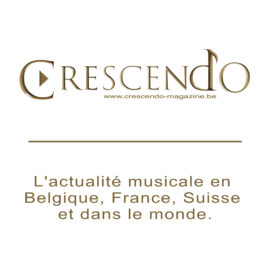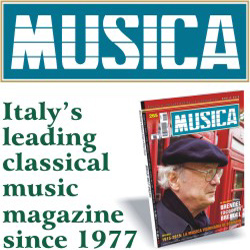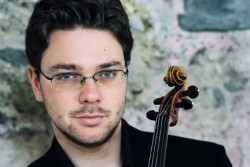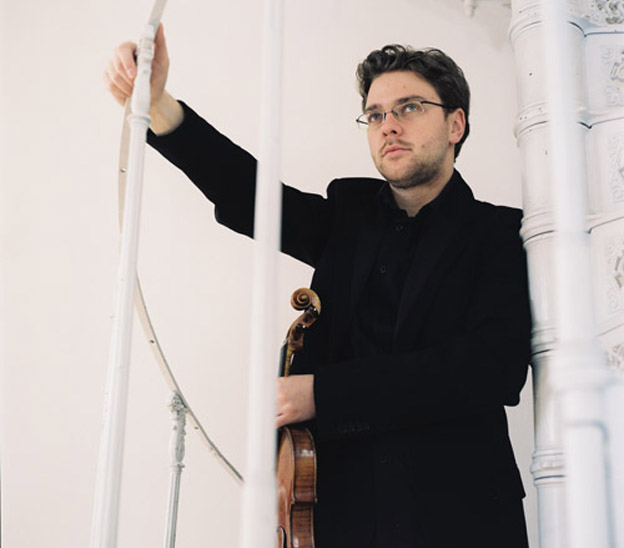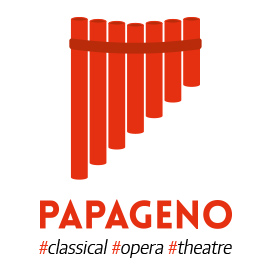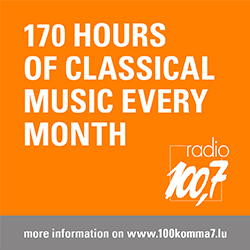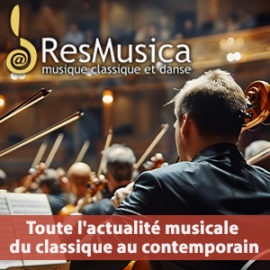Born in Moscow into a family with an established musical tradition, Alexander Sitkovetzky came to study at the Menuhin School in London. Today, he is making a career as soloist and as chamber musician as well. As part of the cpo box with the symphonies and concertos by Andrzej Panufnik, his recording of the Violin Concerto received an ICMA Award in 2015. Alexander Sitkovetzky took part in the ICMA Gala Concert in Ankara, and at this occasion, Remy Franck made the following interview.
Mr. Sitkovetzky, your biography says that you have worked with Yehudi Menuhin and that you went to the Menuhin School. How did that happen?
I was very young, six or seven years old, when I met Yehudi Menuhin for the first time. He knew my family quite well. I am a third-generation musician in my family and he knew already Julian Sitkovetzky, my grand-father. He was a great, great violinist whose life was just cut way too short, and I think if he had lived on, he would have been known absolutely in the same category as David Oistrakh or Leonid Kogan. And of course he knew his son, Dmitry, also a wonderful, successful violinist and conductor, …
With Dmitry you mean your uncle?
Yes. … So, Menuhin knew the family. How exactly he ended up in our apartment in Moscow when I was seven years old, this I don’t know. I think that we sent him a video, he saw it, and then he was quite interested. I was not in any way kind of a prodigy, but I was quite advanced. And I think that was something which was always exciting for him. I played for him in our apartment, and he invited my mom, who is a pianist, and my teacher as well to London. He arranged work permits for my mother and for my teacher. I was at his school from 1991 to 1999. I was not a student of his, but I did play some concerts with him. I played with him the Bach Double when I was nine years old, in Evian Festival and also in Brussels, and then we did some Bartok Duos in St. James’s Palace for Princess Diana and Prince Charles. I also played the Mendelssohn Concerto with him as conductor when I was 13, in Budapest. Obviously, when I talk about it, it sounds like incredible things, but I was so young that I couldn’t appreciate it as much as I do today. You know, back then, all I could see, was the lovely, friendly elderly man who played the violin, conducted and also could stand on its head. He showed me all his yoga things before the performances.
You also had to eat ginger, like he did before his concerts?
I probably wouldn’t have liked ginger back then… So, I was very, very fortunate! Of course he was too busy to truly be involved with everybody at the school, but he was very inspiring for all of us.
How is it for you to have such a known name, Sitkovetzky, and to be possibly mixed up with your uncle? Is that a burden, or do you take any profit from this?
I think it’s neither. Of course the name stood for Dmitry and I was often asked if we were related. I think, my name has been established not so long ago. Once, my uncle called me and he said: “Somebody came up to me and asked: Are you related to Alexander?” That was a nice moment. But, to be honest, for me it’s fantastic to have him as an adviser. Our job is about making music, sure, but at the same time it’s also a business. And especially if you are young and growing up, you need some advice about those less interesting things that need to be talked about as well. Dmitry has always been very supportive. He was never my teacher, because he was too busy to teach, but I would always play for him on a regular basis. He also helped me with the violin that I have now, a Guadagnini, and I’m incredibly grateful to him. I also owe my mom. I’m still playing with her through the concertos, having lessons and things like that. My father hated the violin, so he became a rock musician instead, and he was in a rock band for twenty years. I think in general I’m very lucky to be surrounded by people who really know about what I’m doing, and are able to support me.
Do you feel to be part of the Russian tradition or is this something which you consider no longer as important?
Oh, that’s a difficult question! It’s difficult because I left very early, but at the same time I’ve had mostly Russian teachers. At the same time, my final teacher, Ana Chumachenco, is such a kind of an ‘all-world’-musician who had a lot of different influences. But in her teaching there wasn’t anything that I didn’t know from my Russian background either. So I think, today, with teachers and artists freely travelling around the world, and with so many of the big Russian professors leaving Russia in the last 30, 40 years, the pure traditions have almost disappeared. And what is really Russian School? There was a kind of a Russian School before the Soviet Union, but in many ways that was a kind of continuation of the German School. Leopold von Auer was probably the greatest teacher of all time, his students were among the best violinists of all time, including the best one.
Who is the best one?
Well, I’m a Heifetz guy… Let me say: I feel very much as a Russian person. Yet, when some people do come up to me and say “What good Russian School! », I wouldn’t take that as a compliment. Because I’ve lived here, in the West, from the age of eight, I would like to think that I’ve tried to take the best from everywhere.
As a young musician, do you have to struggle a lot, is it difficult to establish a career because so many violinists are emerging from all around the world, especially from Asia?
I don’t think it’s something that you think about when, hopefully, you are doing something that you really love, and if it keeps you busy. I mean, the musical life is very competitive, but in fact, music should not really be competitive. We should just give our best and play as well as possible, and practice as much as we can. I’m sure it was like this thirty, forty years ago as well, we just don’t know about it. But also people think differently, you know, some people want to play all the time, other people want to be much more selective and specific about what they want to do. You just have to find your own way, to find a balance for yourself. Of course, the difference now is that anybody can be heard, because of the social media, which in many ways is good. Who knows how many great players just passed through the cracks and nobody knew about them because there was just no way to get yourself heard at that time. Now, in some ways, it’s more fair and balanced. At the same time, of course, you have the marketing aspect and you have the big record labels promoting classical music for the popular times. They even think that they will save it, while I think it doesn’t make any difference. I think it’s just the music itself that’s strong enough. Now everybody is always saying the audience is getting older and there are not enough kids at the concerts. I think, that’s normal, I think that unless you are classically trained from a young age, classical music comes to people when they are older.
You have your own piano trio, so that means that you are fond of chamber music?
Yes, a lot! The piano trio is developing very well. We are doing something like 30 concerts a year. We are touring in Europe and in the United States. We have a record label, BIS, and we have recorded two CDs for them…For me it’s perfect… Then I have some string quartet concerts with Julia Fischer as well. And that’s really very little, because everybody is too busy to do a lot, but we have five to ten concerts a year.
What does it mean to you to make recordings? You are present with several recordings in chamber and soloist position…
Until a few years ago I hated recordings. I hated how my sound sounded. I mean, probably it was not bad, I just didn’t like it. And I didn’t enjoy the process because I felt that I was looking for the wrong things. I think that during the first couple of recordings, I was so afraid that the microphone would pick up any imperfection that I stopped. After a while, I would just panic about that and stop thinking that it’s the music that’s the most important thing. So, even though the CDs did well, I was never enjoying the process, and it was always a little bit of a burden. But over the last couple of years I somehow managed to switch. And I think this actually came from a few chamber recordings, where I learned from my partners that the most important thing is to give something musically convincing. And since then, it’s been much more pleasurable. And so, now, I’m kind of looking forward – I don’t know what we are recording next, but I’m looking forward to the next recording.
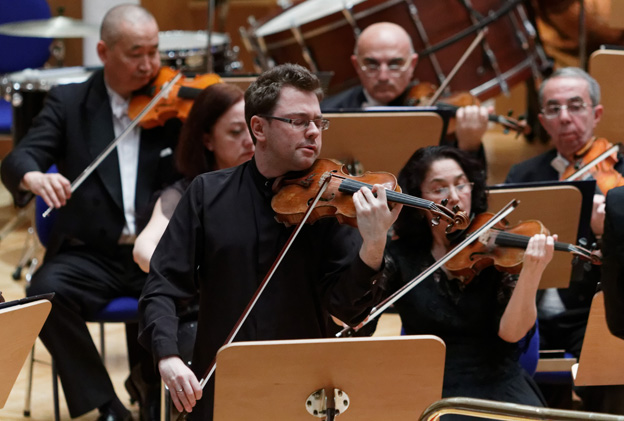
Alexander Sitkovetzky performing the Panufnik Concerto at the ICMA Gala Concert in Ankara, with the Bilkent Symphony Orchestra
(c) Aydin Ramazanoglu
At the ICMA Award Ceremony 2015 in Ankara you played two movements from the Panufnik concerto. You have recorded this concerto, you have played it around the world, and you are a real promoter of this work – why?
I feel that it’s my job as a musician, as a violinist, to get this concerto much more into the mainstream repertoire. I learned the piece actually when I was fifteen. When I was a student at the Yehudi Menuhin School, I was asked to play it, because the concerto originally was written for Yehudi Menuhin. And that’s also how I met Camilla Panufnik who is the wife of Andrzej. I played it a few times at the school and I really loved the piece. I recorded it for the first time when I was nineteen, for EMI, Angel Records back then. And I wanted to play it in public, but, at that time, I was still very young and did not have so much to say in what I was going to play. And then, thanks to Lukasz Borowicz, the wonderful conductor of the Panufnik symphonic works, we could do the recording together. And now, me being a little bit older and maybe having a little bit more to say in what I would like to do, I’ve been fortunate enough to convince a lot of people to do this piece. I did it with the Norwegian Chamber Orchestra, and I will do it again with them next year. After this, I’m going to Riga to do it with the Sinfonietta. With Lukasz we will do it for the BBC Scottish. I’m taking it to Australia for a tour with the Australian Chamber Orchestra. Hopefully other things will be planned for the next years. I’m really happy because every single person that I’ve talked to and who has heard the piece, immediately has a positive reaction. There is never a question of “Oh yeah, it’s interesting” or “Some things are good, some things not”. Many people just immediately say: “Great piece!” And also, thankfully, I am not any longer the only violinist who is performing it. For a 20th century concerto, it’s very well written, it really lets the violin shine very well. It also has such a clear harmonic language! It’s a very tonal piece, but at the same time, it doesn’t sound like anything else, so in no way is it neo-some, it’s not neo-classical or neo-romantic, it’s very much Panufnik’s own personal voice.



